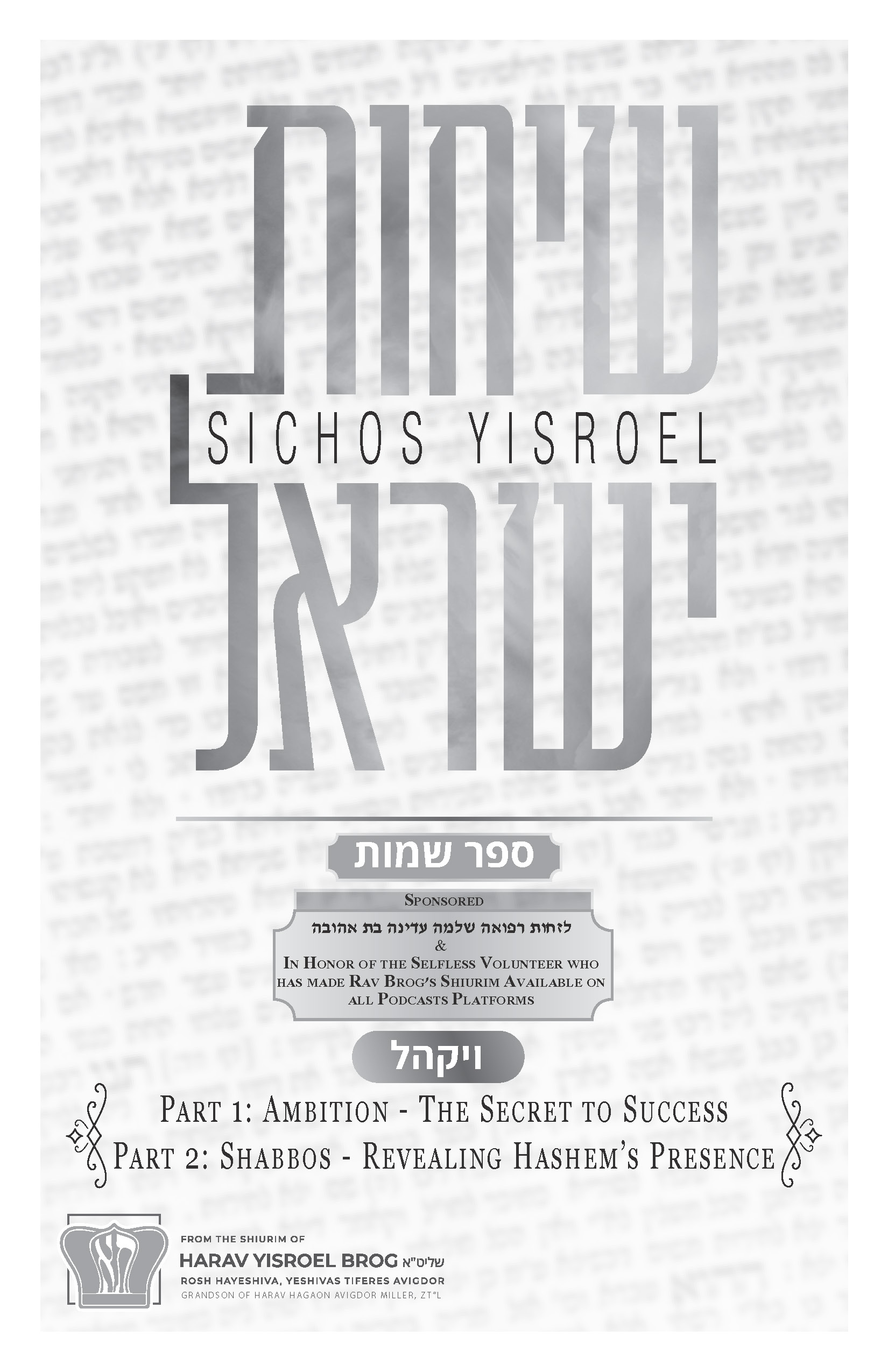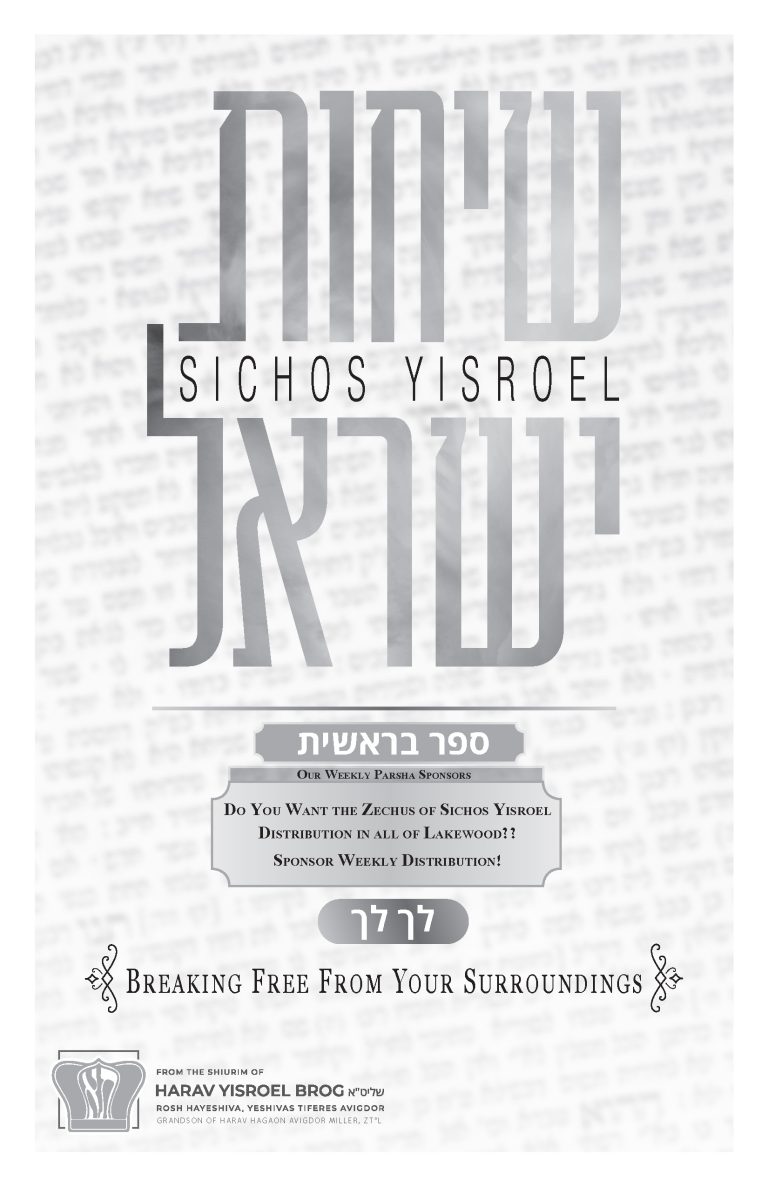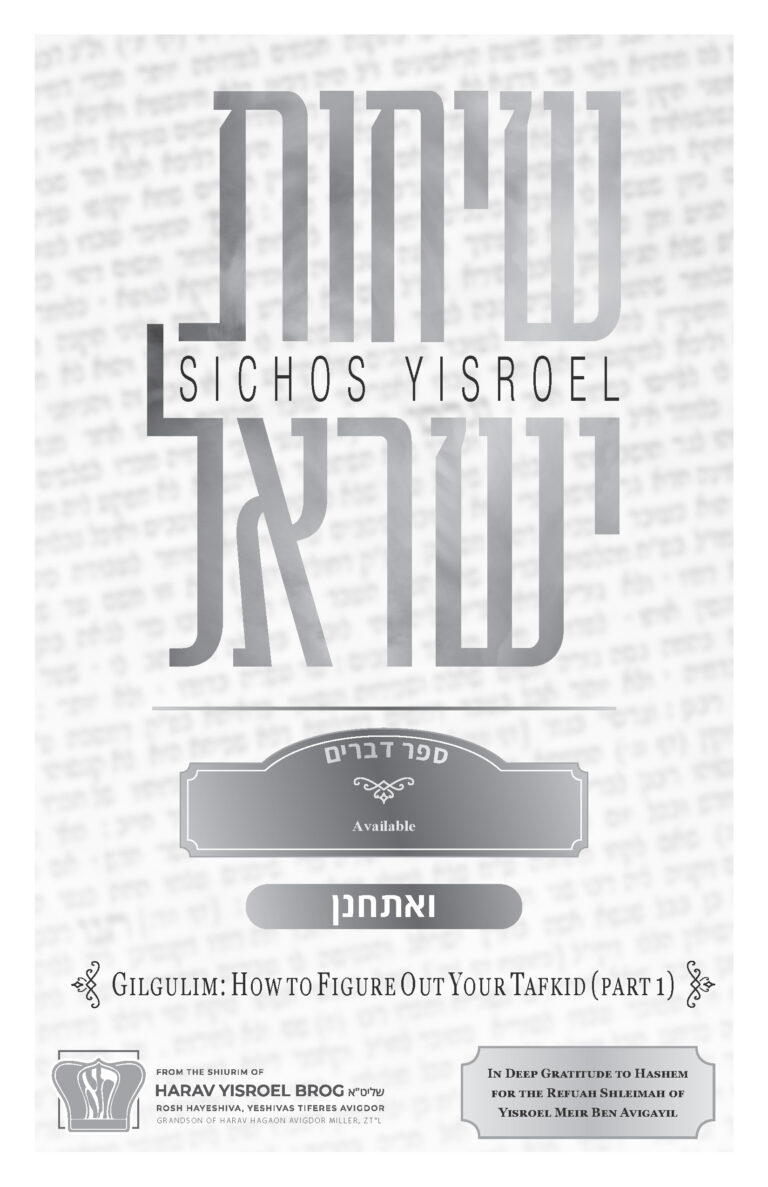Vayakhel 5784: Ambition – The Secret to Success
Sponsored
לזחות רפואה שלמה עדינה בת אהובה
& In Honor of the Selfless Volunteer who has made Rav Brog’s Shiurim Available on all Podcasts Platforms
Consider sponsoring a shiur
Visit YTATorah.org
Shiur presented in 5776
Two Types of People – Naso Libo or Nadav Rucho
In this week’s parshah, it says that Moshe Rabbeinu told Klal Yisrael to come forward with their donations for the Mishkan. ויבאו כל איש אשר נשאו לבו, and every person who was naso libo came,וכל אשר נדבה רוחו אותו , and anyone whose ruach motivated him, ‘הביאו את תרומת ה, they brought the terumah to Hashem, למלאכת אוהל מועד, for the work of the Ohel Moed, ולכל עבדתו, for all the service that was needed, ולבגדי הקודש, and for the holy vestments (Shemos 35:21).
The passuk mentions two classes of people. There were people who were נשאו לבו and there were also those people that were נדבה רוחו. The Ramban (ibid.) writes that when it says in the passuk כל איש אשר נשאו לבו, it refers to החכמים העושים במלאכה – it’s a reference to those chachamim who came to perform the work needed for Mishkan. כי לא מצינו על המתנדבים נשיאות לב, because we don’t find the term nesius lev regarding the people who donated things; אבל יזכיר בהם נדיבות, instead it says the lashon of nedivus, regarding the people who donated things for the Mishkan.[i]
So, the Ramban divides the passuk into two groups of people. When the passuk says וכל אשר נדבה רוחו אותו, it is talking about people who were mesnadev a terumah of zahav vekesef and the like, but the first part of the passuk is talking about a different type of donation. When it talks about nesius halev, that’s talking about people who volunteered to do the melachah. Moshe Rabeinu addressed both of these groups of people, and Betzalel was appointed over both of them.
What is so Special about Nesius Halev?
Now, the Ramban goes on to explain why the Torah uses the term nesius lev in reference to those who came to do the melachah. Why can’t it say nedivas haruach? Why can’t it be that these people came be’nedivas haruach to help with the work? In other words, why can’t somebody who offers work be referred to as a menadev rucho?That same person is also a nadvah rucho! Why do you use the term nesius lev when referring to the people who offered services? That’s what’s bothering the Ramban.
And the Ramban says that, generally, ein hachi nami. If a guy offers to help you put up your sukkah and says, “I’ll come to your house. I’ll make it in your backyard,” that’s not referred to as nesius lev.It’s not the pshat that you can’t utilize the term nadvah rucho when somebody is helping you with a service and not giving you something. No, you can apply the same term. But it’s only in this context that you don’t refer to these people as nadvah rucham but you refer to them as nesius halev, and that’swhat the Ramban is coming to explain, why in this specific context do we refer to them as נשאו לבו?
Says the heilegeh Ramban: כי לא היה בהם מי שלמד את המלאכות האלה ממלמד, none of these Jews who were coming forward to offer their services learned and studied these crafts from any teacher. And there wasn’t any person שאימן בהן ידיו כלל, there was no one amongst them who had trained himself in these crafts. Instead, you had individuals who were מוצא בטבעו, who found and discovered within their nature, שידע לעשות כן, that they knew how to do this and ‘ויגבה לבו בדרכי ה, they raised their hearts in the darkei Hashem, לבא לפני משה לאמר לו, to come before Moshe and say to him, אני אעשה כל אשר אדני דובר, “I’m going to do everything that my master says I should do.”
The term nesius halev is utilized for someone or for a group of people who are ‘גבה ליבם בדרכי ה. These people came forward with a level of confidence. They came forward with a level of willingness that, on the surface,did not make any sense because they had no training in this. That’s what’s called nesius halev. Their hearts lifted them up. It’s gavhus halev, as in’ויגבה לבם בדרכי ה, the lev was lifted up.
A Special Gift of Chachmah
And what is the pshat in this? The Ramban, earlier (31:2),when the Torah tells us that Hashem filled Betzalel with chachmah, says why did Hashem have to fill him with chachmah? He says כי ישראל במצרים פרוכים בעבודת חומר ולבנים, Klal Yisrael in Mitzrayim were oppressed in the work of bricks and mortar; לא למדו מלאכת כסף וזהב וחרושת אבנים טובות, they didn’t learn from anybody the melachah of gold and silver or precious stones, ולא ראו אותם כלל, they didn’t see them at all. They never had access to them; והנה הוא פלא, so it’s a pelah that there should be found amongst them an אדם חכם גדול בכסף ובזהב ובחרושת אבן ועץ וחושב ורוקם ואורג. How is it shayach? He says, even if you have somebody who is לומדים לפני החכמים, you won’t find a single person who is a baki in all these crafts. And here we have a person named Betzalel, a bar mitzvah bachur who is יודע כל החכמות וכל התבונות. Even people who are accustomed and trained in this field of diamond and silver and gold, if they leave that line of work and get involved in bricks and mud לא יוכלו לעשות, they can’t come afterwards and then do this very fine delicate work. That’s why Hashem told Moshe Rabbeinu שיראה הפלא הזה, look at this pelah and you should know, כי הוא מלא אותו, Hashem filled him with רוח אלקים לדעת כל אלה, with a ruach Elokim to know all of these things in order that they should do the Mishkan.
Now, this was a very, very extensive type of spiritual work. It wasn’t only from the physical, the nigleh part of the work that made it difficult. There was so much nistar. There were so many secrets of kabbalah. There was so much knowledge you had to know; the code in which the world was created, and upon which everything stands. But Hakadosh Baruch Hu was mashreh shechinah on Betzalel (and on the osei melachah) and he became a חכם גדול בחכמה בתבונה ובדעת and he knew the sod of the Mishkan and keilim and he was able to convey that to others and the others were also filled with the chachmah.
Now what was the condition? In order to be filled with the chachmah, the condition was that you had to have nesius halev. It required that a person be someone who was nesao libo.
The Heart is the Source of Ratzon
Now, the definition of a nesius halev is a person who lacks the expertise, he lacks the training, he lacks the background, he has no clear knowledge about the service he’s getting involved in, but a gavhus halev is chal on his lev. His lev becomes full of itself bedarkei Hashem. That’s called ga’avah, ga’avah dekedushah. The heart that represents the seat of all ratzon that a person has, that heart is now elevated, מוצא בטבעו שידע לעשות כן, the person looks into himself and he finds the confidence and says, “I can do this!” And he says with a certainty, without a doubt, אני אעשה ככל אשר אדני דובר. This is nesius halev.
Now, the gemara in Brachos (55a) says: אמר רבי יוחנן אין הקדוש ברוך הוא נותן חכמה אלא למי שיש בו חכמה, Hashem only grants wisdom to one who already possesses wisdom.One of the pesukim the gemara brings down is: ובלב כל חכם לב נתתי חכמה ועשו את כל אשר צויתיך, “in hearts of every chacham lev, I have put chachmah, and they shall do all that I have commanded” (Shemos 31:6). What does a “chacham lev” mean? In the heart of every chacham lev Hashem puts chachmah. One pshat we said last time is that it refers to yiras Hashem. Today, we’re going to share with you another pshat and that is, that the meleches haMishkan was be’emes something above and beyond their knowledge, as we saw in the Ramban. A person who was יודע בטבעו, who felt within his teva that he wants to do and he’s going to do this type of service, that’s called chachmas halev. That confidence, that sense that, “I’m going to do whatever אדוני דובר,” grants that lev with chachmah. A chachmas lev is a lev that is a rotzeh, that is a meshtokeik to know and do what Hakadosh Baruch Hu wants us to do.
You have to know that every one of us has a desire to know things. You can’t know anything without some type of investment and effort in gaining that knowledge. You apprentice, you study, you’re mekabel, you practice. There are many different ways. A ba’al kishron can chap things. He could understand them quickly. But he’s not going to get to the tachlis of the essence of the chachmah. You have to have kabbalah. You have to have a rebbi. A rav and talmid, that’s how it goes. לא יגעת ומצאת אל תאמין, if you weren’t meyageh, if you didn’t toil and you claim that you got it, אל תאמין. Chachmah is something which is a kinyan in my nefesh. Chachmah is not some kind of layer that a guy wears on his head. It’s not like a hat. Chachmah becomes a cheilek of the person. It becomes the essence of the mentsch. A person who merely has some chachmah in his head is called a חמור נושא ספרים, a donkey laden with books. Chachmas halev comes as a result of a person toiling, a person seeking, a person desiring and then a person acquiring.
There is a concept called a mevakesh chachmah. The Rambam writes that if a talmid goes into galus in the arei miklat, the rebbi goes into galus with him.[ii] Why? Because it says vechai, that when somebody runs to the arei miklat you have to ascertain and make sure that the person is going to have chiyus. He’s going to be provided a life and he’s not going to wither and die. The Rambam writes וחיי בעלי החכמה ומבקשיה, chachmah is something you have a ba’alus on. It’s a kinyan in a mentsch. Who is a ba’alim on chachmah? Somebody who is a mevakesh chachmah. The Rambam says, somebody who is a mevakesh chachmah,so a talmid who doesn’t have his rebbi to moser to him Torah, כמיתה חשובה, it’s like misah, like death.
It’s very difficult for us to imagine this because we don’t see chachmah as establishing a mentsch. We see people who are chachamim. We see geniuses who look very unsettled, very unstable, not the people you would say that chachmah has taken up residence in their essence and created a ba’al chachmah. We think of people who are very, very smart, usually as freaks of nature. They’re very irregular, unsettled, unhealthy individuals, a lot of times. You have to know the chachmah we’re talking about is a chachmah that a person is mevakesh and that a person is koneh.
Lev represents ratzon. Chachmas halev means, “I’m a rotzeh bechachmah.”That’s what it means. I’m a rotzeh bechachmah. So, when Hakadosh Baruch Hu says ובלב כל חכם לב נתתי חכמה, it doesn’t mean that Hashem gives chachmah to someone who is simply a chacham. The passuk says He gives chachmah to one who is a chamam lev, which means that he has the ratzon and the desire for chachmah.
The passuk says: וכל אשר נשאו לבו, they were people who didn’t have a training, but ‘ויגבה לבם בדרכי ה and that way it caused them a hisrabus of chachmah and they were able to say, כל אשר אדני דובר אני אעשה – “Whatever you say to do, I’m going to do.” Then a person has that tosfos. He’s zocheh to that ribuy of chachmah that Hashem grants him and Hashem bequeaths him.
That’s what a mentsch has to know.
Running After Chochmah
This is the yesod of all the yesodos. When a person approaches learning, when he approaches Torah, when he approaches any chachmah of Hashem, the first thing he has to ask himself is, “Do I want to acquire the chachmah or just dabble in it?” If you’re willing to be koneh the chachmah, are you willing to put forth efforts involved in being koneh chachmah? Many people say, “I’m a rotzeh,to be a talmid chacham,” but the question is are you willing to invest? Are you willing to put in the time and the effort that is required? Are you a chacham lev? Or are you somebody who says, “You know, I’m very busy. My life is busy. I’m not young anymore. I’m already older.” Perhaps you’re already working. Perhaps you’re married and you already, so to speak, finished “playing the game.” Or you’re a bachur who complains that his background wasn’t strong or there were some years he didn’t learn well. There are plenty of excuses, believe me. If you ask people, “Why aren’t you going to make it?” Each guy will say, “Well I have ADD. I can’t sit. I had a bad start. My younger years weren’t so strong. My future doesn’t look that bright. I’m not that smart.” So on and so forth.A person could have all these bubbemeisas.
Do you know what the common denominator between all these people is? You’re not a chacham lev. You’re not a rotzeh bechachmah. Because if you would be a rotzeh bechachmah,Hakadosh Baruch Huwould add chachmah. Hakadosh Baruch Hu would be marbeh chachmah to you. Hakadosh Baruch Hu would increase your capabilities. He would increase your shaychus. But you have to come forward and say ‘ויגבה לבו בדרכי ה. You have to come forward and say כל אשר אדני דובר אני אעשה. But if you can’t say כל אשר אדני דובר אני אעשה, you’re not willing to be mevakesh chachmah.
Of course, you’re chafetz bechachmah,but you’re not a rotzeh bechachmah. You’re not somebody who is running to chachmah. And if you lack that, you lack nesius halev. If you would only be able to tap into a little nesius halev, a little confidence and make a plan, and make this your career and make this, “I’m going to do it. I’m going to make it. I’m going to know something. I’m going to master something.” Then you will be zocheh. You see a shvere gemara, a shvere Tosfos, you say, “I’m going to know this. No matter what it takes, I’m going to learn it over and over and I’m going to master this knowledge. I’m going to acquire the knowledge. I’m going to be koneh the chachmah.”These are people who are ba’alei chachmah, mevakshim chachmah.
Here is a guy who sits there and doesn’t put his kochos in. He looks into it a little here and a little there. He’s gornisht mevakesh. He’s rotzeh leknos without any yegiah. He’s a rotzeh leknos without any effort.
Rabbosai, this is a tremendous giluy Hakadosh Baruch Hu showed us, that whenever a person is a real mevakesh, Hakadosh Baruch Huwill be mosef chachmah. If a person is rotzeh to know the stock market, I’m not saying Hashem is going to give you that chachmah. It doesn’t say that anywhere. If a guy is rotzeh to be rich, it doesn’t say Hashem is going to necessarily make him rich. But if a person is a rotzeh to demonstrate some nesius halev in any darkei Hashem, in anything that Hakadosh Baruch Hu wants, then that person could be an individual who is zocheh to בלב כל חכם לב נתתי חכמה.
Hakadosh Baruch Hu should help us develop that ratzon, to be meshtokek, to be chachmei lev, to be mevakshei Hashem. And if we do that, we will be zocheh to ribuy in chachmah.
The Bottom Line
The Ramban wonders why the group of people who volunteered to do the difficult melachos in the construction of the Mishkan, were referred to as those who were אשר נשאו לבו, as opposed to אשר נדבה רוחו. He explains that the term נשאו לבו is reserved for a specific person who, despite not being trained in a certain craft, his heart “lifted him up” with a high level of ratzon to step up and offer to do whatever needed to be done. These people were on a special madreigah of ’ויגבה לבך בדרכי ה. The prerequisite for Hashem to fill a person – not only with an external working knowledge of the melachah but also with the secret, hidden aspects of the special craft – was נשיאות הלב, a heart filled with ga’avah dekedushah. Indeed, this attitude of “I can do this” when said with confidence – despite the lack of knowledge or experience – is what נשיאות הלב is all about. The term חכמת הלב mentioned in the passuk likewise refers to someone, who despite the lack of knowledge, is in the category of יודע בטבעו – someone who feels deep down, within his nature, that he’s going to accomplish and he wants to accomplish a given spiritual goal. And when a person exhibits this attitude called חכמת הלב, where he has an inner confidence – driven by a deep desire to accomplish even a very lofty spiritual goals – this causes Hashem to put more chachmah in his heart!
Part 2: The Essence Of Shabbos (5768)
Klal Yisrael and Shabbos
In the past, we discussed the uniqueness of Shabbos mitzad Hashem Yisbarach, from Hashem’s perspective, and from the perspective of Klal Yisrael. Shabbos is the window to the world for Hashem to reveal His kavod in this universe. The partner – the ben zug, the “mate” of Shabbos to enable that to happen – is Klal Yisrael. A davar nifla comes out from understanding this concept about Shabbos: just like the essence of Shabbos testifies that there is a Hashem Yisbarach and is megaleh (reveals) His kavod and malchus in the world, so too, Am Yisrael testifies to the giluy of HaKadosh Baruch Hu in this world! That means it’s a partnership. When the Torah says (Shemos 31:16): ושמרו בני ישראל את השבת לעשות את השבת, “And Bnei Yisrael shall keep the Shabbos, to ‘make’ Shabbos throughout the ages as a covenant for all times,” we see that through shemiras Shabbos, Klal Yisrael ‘makes’ Shabbos. That means, the essence of Shabbos is to reveal the malchus of HaKadosh Baruch Hu in the world. Shabbos is to the world, what the neshamah is to the guf. What testifies that a person is one with HaKadosh Baruch Hu is the fact that a person has a neshamah. Shabbos is the neshamah of the world. Just like a neshamah cannot operate without a body, so, too Shabbos, which is a neshamah of the world, cannot operate without Klal Yisrael. A person must understand this, because it forms the basis of how Klal Yisrael relates to Shabbos.
Shabbos Reveals Hashem in this World
Now, I want to share with you the words of the Rambam I found in Igeres Taimon.[iii] He writes as follows: וכן הבטיחנו הבורא על ידי נביאיו, HaKadosh Baruch Hu promised us through His nevi’im, שלא נאבד, that we will not be lost, ולא יעשה עמנו כליה, and HaKadosh Baruch Hu will not destroy us, and we will never cease from the world from being an אומה חסידה, a special nation. The Rambam goes on to say: וכמו שאי אפשר, just like it is impossible, שתתבטל מציאותו של הקדוש ברוך הוא, that HaKadosh Baruch Hu in the world can become batul (nullified), כן, so too, אי אפשר, it’s impossible, שנאבד, that we, as nation, should be destroyed, ונתבטל מן העולם and annihilated from this world. Klal Yisrael’s metziyus (existence) is intertwined with Hashem’s metzius in this world. It doesn’t mean, chas veshalom, that Hashem has a metziyus. What it means is that Klal Yisrael’s metziyus in this world is completely dependent on Hashem’s existence, שכן אמר, it says in the passuk in Malachi, אני ה’ לא שניתי, I am Hashem Who doesn’t change, ואתם בני יעקב, and you – the sons of Yaakov – לא כליתם, do not get destroyed. HaKadosh Baruch Hu promises that כי לא תשכח מפי זרעו, it will not be forgotten from the mouths of Klal Yisrael. So Hashem was mevaser (informed) us through his navi Malachi that the os between us and HaKadosh Baruch Hu – the greatest miracle there is – is that שלא נאבד, is that we are not going to get destroyed!You know what the ra’ayah (proof) to that is? The Rambam says it is the kiyum of Toras Hashem, and HaKadosh Baruch Hu’s dibbur amongst us. The existence of the Torah is our key to knowing what the ratzon Hashem is, and it is how we are mefarsem (publicize) the giluy (revelation) of HaKadosh Baruch Hu in the world. The source of this revelation is the yom haShabbos. This dependency and connection is expressed when a yid comes to Shabbos and he says Hashem Elokeinu – it means Hashem is our Hashem. Practically speaking, we have to ask in what way is Hashem specifically only “our” Hashem? Hashem is Hashem of the whole world!!
The Greatest Promise
The Beis Halevi explains this idea in Parshas Vayigash where he says, that the greatest havtachah (promise) that HaKadosh Baruch Hu gave us, is the fact that HaKadosh Baruch Hu’s metzius in this world is mekushar, is bound, with our existence. This is the greatest guarantee that Klal Yisrael won’t get destroyed. Now, it’s not a guarantee that an individual won’t get destroyed. Therefore, it behooves us to understand that our job, our goal and our role in this world is to sign up to be an active member in the party of Klal Yisrael with a goal to be megaleh the kavod of Hashem Yisbarach.
The Vilna Gaon writes the following in his sefer called Yahel Ohr: ואלו יעצר ח”ו, if chas veshalom the world would be bereft or lacking d’veikus to Hashem by yirei Hashem, אפילו רגע אחד, even if it’s for one second, שלא יהיה מי שיכיר כבודו וגודלו, if there would not be someone who recognizes Hashem’s greatness and kavod, the world will cease to exist.[iv]
There is a famous Reb Chaim Volozhin in Nefesh Chaim (שער ד פרק יא) that says if the world would go one second without Torah, it would cease to exist.[v] In this Gr”a, however, I found even a bigger chiddush. He says that if the world would go for one moment, שלא יהיה מי שיכיר כבודו וגודלו, whereby someone doesn’t recognize the kavod and the greatness of HaKadosh Baruch Hu, היה נשאר העולם כלא היה, the world would go back, as if it did not exist. The Gr”a writes that it’s not shayach that the world should be ריק מזה חס ושלום. And he says, אין לך דור ודור, there is no generation, שלא יהיו ירא השם, that won’t have some G-d fearing people, דבקים תמיד ביראתו ורוממות אהבתו בלי הפסקה זה או זה, who are connected to HaKadosh Baruch Hu’s fear, exaltedness and love without a moment’s interruption, שאין רגע שיהא נפסק ח”ו דבקות ה’ מישראל ובזה נתקיים העולם – that there isn’t a mere moment when that d’veikus to Hashem is severed from among Klal Yisrael, and for this reason, the world continues to exist.
Witnesses for Hashem
Therefore, the hergesh, the feeling that a yid has to have on Shabbos is what a famous passuk says: ’ואתם עדי נאום ה – “You are My eidim,” says Hashem. “You are My witnesses” (Yeshaya 43:10). A person has to think about this throughout their Shabbos, at different times, “HaKadosh Baruch Hu, my shemiras Shabbos is testifying to Your existence.” When you come home after shul on Friday night, you have to consider that the fact that you changed your clothes, the fact that you were rochetz (washed for Shabbos), the fact that you prepared for Shabbos, the fact that you were mekabel Shabbos, the fact that you will be misnaneg (enjoying Shabbos) and will be shomer Shabbos. For those actions alone, you have to think: “I am being mei’id eidus (I am testifying) regarding HaKadosh Baruch Hu, as the passuk says, ’אתם עדי נאום ה – you are My witnesses, כִּי אֲנִי הוּא לְפָנַי לֹא נוֹצַר א-ל וְאַחֲרַי לֹא יִהְיֶה – “I am the One, Before Me no god was formed, and after Me none shall exist.” Chazal (Sifrei Devarim 346:2) explain, כשאתם עדי, when you are My witnesses, then אני א-ל, I am Hashem, וכשאין אתם עדי, and when you are not My witnesses, אין אני א-ל, I am not HaKadosh Baruch Hu. It’s unbelievable! Of course HaKadosh Baruch Hu is HaKadosh Baruch Hu. It means the way HaKadosh Baruch Hu set this world up is that He was megaleh, he revealed Himself, and He wants His malchus to be nisgaleh, to be openly revealed, and we are the only vehicle through which that can be done! So the first thing is, a person has to develop a sense of appreciation for this idea.
Revealing the Kavod of Hashem
You have to think about this idea. If you’re not going to think about this, you will never get to an appreciation of Shabbos and you will live bechoshech (in the darkness) even on Shabbos, rachmana litzlan. A person has to go through his or her Shabbos and think a number of times, “HaKadosh Baruch Hu, I am testifying that You are the borei olam and You run the world. You run a system of sechar ve’onesh, You are mashgiach on every single prat and prat (detail) in this world and You direct everything in this world.” Everything is a challenge for us and potentially an opportunity. Every challenge (of trying to reveal Hashem in this world) can become an accomplishment if we rise to the challenge. But you have to understand that this mechanism is the shoresh HaShabbos. That’s why on Shabbos, the yid stands out more than anybody else because the destiny of Klal Yisrael is bound to that of Hakodosh Baruch Hu. That’s why it’s not shayach for somebody from the umos ha’olam to keep Shabbos. Somebody from the umos ha’olam, as the Rambam paskens, can do a lot of mitzvos. They can do most mitzvosif they want to. But not Shabbos because this is the essence of Yisrael, which is to be megaleh the kavod of Hashem. When a non-Jew keeps Shabbos, it’s as if he’s saying, “I also have a role in bringing the kavod of Hashem to the world.” That, only a Yid can do. This is among the basic tenets of our emunah. Now, this emunah is not a pashut emunah that can be taken for granted. Sadly, today many frum people are afraid, rachmana litzlan, to say that HaKadosh Baruch Hu directs and controls the world.
The Unmet “Covenants”
I was recently involved in a case where someone invested millions and millions of dollars into a large corporation. When he made this investment, there were a lot of conditions. The conditions are called, in legal terms, “covenants.” That means the company is expected to perform according to these predetermined covenants. If they don’t, then – at the minimum – they get a big fine, and at most, they could even forfeit the company (to the investor). The fellow who was managing these investments, after the investments were done, was a very tough person, and he was very hard on the company. For some reason, the company did not meet one of these “covenants” and the people behind this company went into a pachad (fear). What they originally thought was their biggest tovah – that someone invested in them a lot of money – turned out to be a big problem. This person said, “Buddy, I think I’m taking the company from you, or at the very least I will demand a fine of hundreds of thousands of dollars.” You have no idea of the type of fine they could have faced. There was such a fear, that the guys who were running the company put a number of things they were going to undertake on hold, because of the fear of losing everything or, at the least paying the huge fine. Then, one of the fellows (who ran this company) called me up and said, “Could I come to you for a business meeting?” He sounded a bit desperate, so I said, “Sure.” He comes in with his whole portfolio, starts opening it up, and he tells me what the covenants are, what type of a deal this is, how off they are, etc. Then he tells me, “I’m petrified. Which route do you think I should take?”
The Strangest Corporate Meeting
I told him, “The first thing – close the portfolio. Close it. The next thing is – let me open the right book.” The book we opened was called the Nefesh Hachaim (שער ג פרק יב).[vi] I explained to the fellow the concept of אין עוד מלבדו, that nobody (even if that other fellow who invested $12 million dollars in his company) is in control here, besides HaKadosh Baruch Hu. I told him, “You have to grasp this understanding.” I spoke to the fellow for maybe 10 or 15 minutes and explained to him what it’s all about. He tells me, “With all due respect, I came here for some business advice, and this is not advice.” I said, “That’s what you think. This is advice.” He said, “I’m dealing with a company, I have non-Jewish employees who work for me. What should I do?” I told him, “Get your non-Jewish employees together. Call them all together, and tell them this principle, that we Jews believe in what’s called אין עוד מלבדו, which means that only HaKadosh Baruch Hu runs the world.” He said, “Are you serious?! You really want me to call a corporate meeting and tell these people, ‘Folks, let me tell you how we are going to deal with this problem. We are going the אין עוד מלבדו route!’” I said, “That’s exactly right! Tell them that after seeking out a number of different avenues of how to deal with this problem, you will go this route. Explain to them what this principle is, and just say that we believe that Hashem runs the world. The whole company is based on Hashem. Explain this to them.” I said, “If you have emunah in Hashem, you have to tell them this.”
The “Purim-Like” Miracle
You know what the problem is? When many yidden go around in public and someone asks them, “Tell me, do you think that Hashem really runs the world?” they sheepishly answer, “That’s the Jewish belief,” כאילו (as if) there is a doubt – that you have your belief and I have my belief. When they say, “This is the Jewish belief,” they are saying, “Maybe. I’m not really sure if He’s involved.” No, no! There is nothing but HaKadosh Baruch Hu and you have to believe that completely! You have to tell yourself that.
So they had this big corporate meeting. I was mechazek him beforehand and I told him, “Get up and tell the non-Jewish employees straight!” The main investor was flying in from out of town for that two or three hour meeting, and they were all mamish holding their breath over there and trembling. So I told the guy, “Go ahead with your project, continue whatever you’re doing and just ignore that main investor.” He called me up three hours later and he said, “You are not going to believe it!” He said, “Pashut, this person came in, and it was venahafoch hu (Purim-like reversal). The same personthat was Haman yesterday, today he was ohev yehudim (i.e. the same guy who hated my company just the day before, today was in love with it). He was pashut ohev (loved) the company. It doesn’t make any sense! The guy was a sonei (hater), he was me’aneh us, he afflicted us, he made us meshuge. And he changed from a sonei to an ohev! How is it shayach?! And everybody told me, ‘You see, your אין עוד מלבדו worked!’” This Yid was zoiche to reveal the presence of Hashem in this world through this story.
We have to understand and we have to get this emunah into us. We are the single, sole agency for HaKadosh Baruch Hu’s kavod to be misgaleh in this world. If a person thinks and contemplates about that when he keeps Shabbos, there is no question that he’ll have a different Shabbos and he’ll take a different role in the knesses Yisrael. There is no question that he will play a different role in bringing the kavod of HaKadosh Baruch Hu into the world, which is the tachlis of the briah (the purpose of creation).
The Bottom Line
Regarding Shabbos, we learned a tremendous idea, that the essence and the shoresh of Shabbos is to reveal and publicize Hashem’s existence, malchus and kavod in this world. This happens when Klal Yisrael (and only Klal Yisrael) properly observes this holy day. This coming Shabbos, as I walk back to my house from my shul (and throughout the day), I will review and think about the various preparations I made for Shabbos, about my acceptance and enjoyment of Shabbos – all in order to reawaken the feeling within me that I am testifying to Hashem’s kavod in the world and to understand how Klal Yisrael, is the partner, the ben zug, of Shabbos!
[i] ויבאו כל איש אשר נשאו לבו על החכמים העושים במלאכה יאמר כן, כי לא מצינו על המתנדבים נשיאות לב, אבל יזכיר בהם נדיבות. וטעם אשר נשאו לבו, לקרבה אל המלאכה, כי לא היה בהם שלמד את המלאכות האלה ממלמד, או מי שאימן בהן ידיו כלל, אבל מצא בטבעו שידע לעשות כן, ויגבה לבו בדרכי ה’ (דה”ב יז ו) לבא לפני משה לאמר לו אני אעשה כל אשר אדני דובר וכבר הזכרתי זה בסדר האחר (רמב”ן על שמות ל״א:ב׳). והנה אמר שבאו לפני משה כל אשר נשאו לבו לקרבה אל המלאכה, וכל אשר נדבה רוחו אותו הביאו התרומה והנה משה אמר לכולם כי קרא ה’ בשם בצלאל ואהליאב (שמות ל״ה:ל׳), ואחרי כן קרא להם משה ואל כל חכם לב (שמות ל״ו:ב׳) שיבואו לפניו ונתן להם הנדבה.
[ii] תַּלְמִיד שֶׁגָּלָה לְעָרֵי מִקְלָט מַגְלִין רַבּוֹ עִמּוֹ שֶׁנֶּאֱמַר וָחָי עֲשֵׂה לוֹ כְּדֵי שֶׁיִּחְיֶה וְחַיֵּי בַּעֲלֵי חָכְמָה וּמְבַקְּשֶׁיהָ בְּלֹא תַּלְמוּד תּוֹרָה כְּמִיתָה חֲשׁוּבִין. וְכֵן הָרַב שֶׁגָּלָה מַגְלִין יְשִׁיבָתוֹ עִמּוֹ (הלכות רוצח ושמירת נפש פ”ז ה”א)
[iii] וכן הבטיחנו הבורא על ידי נביאיו שלא נאבד ולא יעשה עמנו כליה ולא נסור לעולם מלהיות אומה חסידה וכמו שאי אפשר שיתבטל מציאותו של הקב”ה כן אי אפשר שנאבד ונתבטל מן העולם שכן אמר (מלאכי ג’ ו’) אני ה’ לא שניתי ואתם בני יעקב לא כליתם, וכו’ (איגרות הרמב”ם שם)
[iv] וז”ל: ואלו יעצר ח”ו אפילו רגע אחד שלא יהא ח”ו מי שיכיר כבודו וגודלו [דהשי”ת] היה נשאר העוה”ז כלא היה וכו’, אך מעולם אין ריק מזה ח”ו כי אין לך דור שלא יהיה יראי ה’ שהם דבקים תמיד ביראתו ורוממות אהבתו בלי הפסקה זה או זה, שאין רגע שיהא נפסק ח”ו דבקות ה’ מישראל ובזה נתקיים העולם, ולזה אמר האבות הן הן המרכבה, כי הם תמיד דבקים בו יתברך כל ימיהם בלי הפסק רגע, וכו’. (רעיא מהימנא השמטות ח”א)
[v] והאמת בלתי שום ספק כלל שאם היה העולם כולו מקצה עד קצהו פנוי ח״ו אף רגע אחת ממש מהעסק והתבוננות שלנו בתורה כרגע היו נחרבים כל העולמות עליונים ותחתונים והיו לאפס ותהו חס ושלום וכן שפעת אורם או מיעוטו ח״ו הכל רק כפי ענין ורוב עסקנו בה.)
[vi] [ולכן גם ר”ח לא שבטח על זכות קדושת תורתו ומעשיו המרובים. רק שידע ושיער בנפשו שזאת האמונה קבועה בלבו לאמיתה שאין עוד מלבדו יתב’ שום כח כלל. והדביק עצמו בקדושת מחשבתו לבעל הכחות כולם אדון יחיד המלא כל עלמין ואין כאן שום שליטה ומציאות כח אחר כלל. לכן היה נכון לבו בטוח בזה שלא ישלטו עליו פעולות הכשפים הנמשכים מכחות המרכבה טמאה. ז”ש לא מסתייע’ מילתיך אין עוד מלבדו כתיב.] ובאמת הוא ענין גדול וסגולה נפלאה להסר ולבטל מעליו כל דינין ורצונות אחרים שלא יוכלו לשלוט בו ולא יעשו שום רושם כלל. כשהאדם קובע בלבו לאמר הלא ה’ הוא האלקים האמתי ואין עוד מלבדו יתברך שום כח בעולם וכל העולמות כלל והכל מלא רק אחדותו הפשוט ית”ש. ומבטל בלבו ביטול גמור ואינו משגיח כלל על שום כח ורצון בעולם. ומשעבד ומדבק טוהר מחשבתו רק לאדון יחיד ב”ה. כן יספיק הוא יתב’ בידו שממילא יתבטלו מעליו כל הכחות והרצונות שבעולם שלא יוכלו לפעול לו שום דבר כלל.






